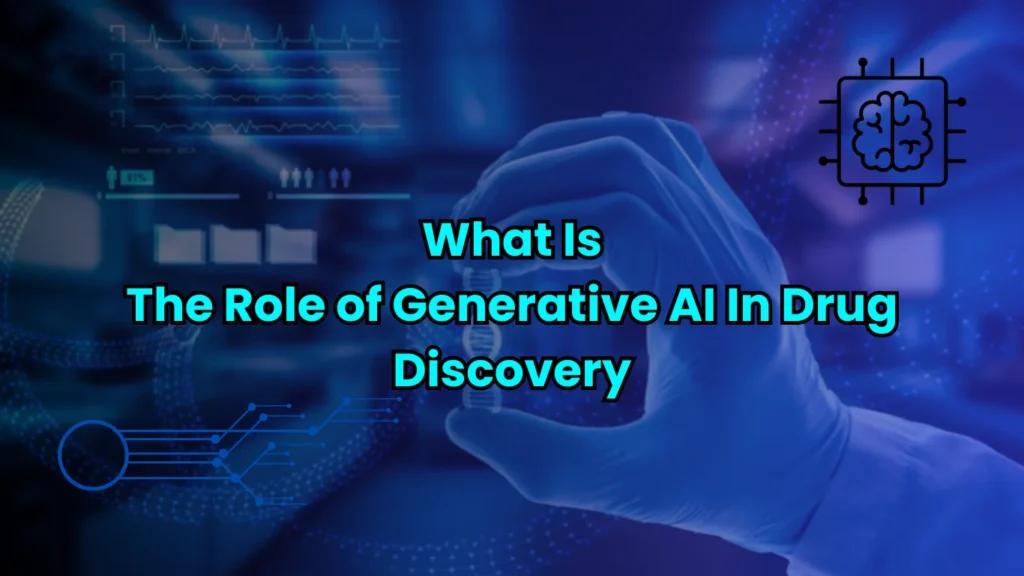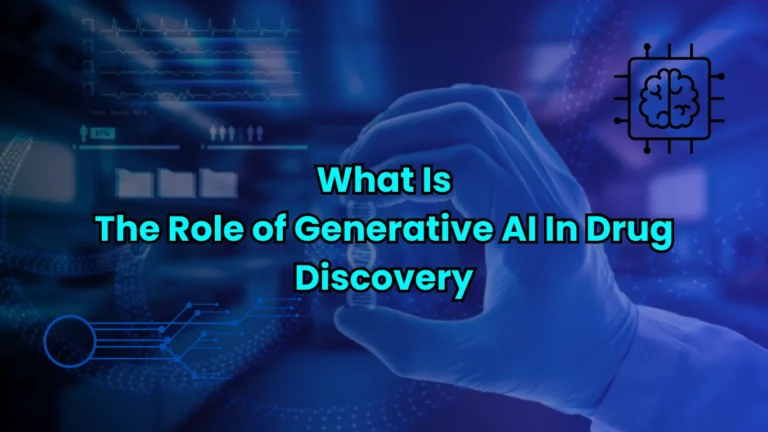Drug discovery is one such area that is very important and challenging for health. Identifying a drug’s potential and developing it takes time and money, and it also requires facing uncertainty. But currently, generative artificial intelligence (AI) has been developed as a revolutionary technology that has the potential to revolutionize drug discovery.
By harnessing the power of machine learning algorithms, generative AI promises to speed up drug development, reduce costs, and ultimately save lives.

Table of Contents
Read More: Who Is Father of In AI
What is Generative AI?
Generative AI is a branch of artificial intelligence that focuses on creating new data instances rather than simply processing or analyzing existing data.
This works on the principle of unsupervised learning, where the AI model gets the opportunity to learn patterns from the dataset without explicit labels. This enables generative AI models to create new samples, such as drawings, written forms, or chemical structures, in the context of drug discovery.
What is the role of Generative AI in drug discovery?
The role of generative AI in drug discovery is that it will change the way drug candidates are identified and developed rapidly. Using machine learning algorithms such as generative adversarial networks (GANs), recurrent neural networks (RNNs), and graph neural networks (GNNs), generative AI can generate new chemical structures, improve drug design, and help in drug design.
These examples allow researchers to navigate a vast chemical orbit in a way they could not do using traditional methods.
What is the role of Generative AI in drug discovery? use
Drug Design Optimization: Generative AI can also help in improving drug design. This helps in optimizing drug design by generating modifications of existing compounds. By exploring the depths of change in molecular structures, AI algorithms can identify modifications that improve drug efficacy, safety, and specificity.
De Novo Drug Design: One of the most interesting uses of generative AI is in de novo drug design. This involves designing a new chemical for a specific disease. Known AI models, which have learned from existing drugs and their properties in very large databases, can produce molecular structures that may reveal some useful properties.
Generative AI Techniques in Drug Discovery:
Generative Adversarial Networks (GANs): GANs are a type of generative AI models that contain two neural networks: a generator and a discriminator. The generator generates new data instances while the discriminator tries to integrate them into the original and generated data.
Reinforcement Learning: Reinforcement learning is a type of machine learning in which an AI agent interacts with its environment to achieve a certain goal. He gets feedback in the form of rewards or penalties, which helps him learn what to do to get what kind of results.
Graph Neural Networks (GNNs): GNNs are a type of neural network designed to work with graph-structured data, such as chemical graphs, in which nodes represent atoms and edges represent chemical bonds. GNNs can learn patterns and interactions from chemical graphs, making them useful in predicting molecular properties and activity.
Transfer Learning: Transfer learning is a technique in which a model is taught for one task and then used to improve or fine-tune it for a related task. This helps in improving the knowledge of AI models from one domain to another.
Benefits of Generative AI:
Speeding up drug discovery: Generative AI speeds up drug discovery, allowing researchers to roam around in a giant chemical chamber.
Cost savings: Traditional drug discovery costs crores of rupees. Generative AI can bring us closer to success by improving drug discovery and reducing laborious lab work.
Diagnosis and individualized treatment of rare diseases: For rare diseases for which less data is available, generative AI can also help in treating those diseases. It is also suitable for individual treatment, in which treatment can be tailored based on the individual’s genetic makeup and disease profile.
Disadvantages of Generative AI:
Grayness and Bias of Data: The accuracy and bias of generative AI models are based on the grayness and bias of the data. Based on incomplete data, such models are able to generate uncertain and safe drugs.
Safety and Distinctiveness Prediction: Generative AI models have difficulty correctly predicting the safety and distinctiveness of the molecules they create. This is a very important concern because the ultimate objective is to make the medicine not only effective but also specific.
Intellectual Property Issues: Intellectual property issues have arisen when generative AI is used in drug discovery. If AI algorithms produce a new drug, it may be difficult to trace patent rights and ownership.
Ethical Considerations: The use of AI in drug discovery raises ethical questions, such as patient confidentiality, consent, and clarity in decision-making. Generative AI needs improvement and clear guidance to be responsible and follow the historical line.
Conclusion
Generative AI is a major advance in drug discovery, helping to identify potential drug candidates, reduce development costs, and improve individual outcomes. But, along with gunvatta, it is also necessary to take care of personality, intellectual wealth, and moral advice. Along with the development of generative AI, its correct use and ethical consequences must also be determined so that it can truly help improve our health.
FAQ: What Is The Role of Generative AI In Drug Discovery?
Q: What is the role of generative AI in drug discovery Mcq?
ANS: To find new drugs, generative AI is used to train models on massive datasets of known chemical structures and their attributes.
Q: How does AI help with drug discovery?
ANS: It is being trained to handle the enormous volumes of paperwork and data that accompany any pharmaceutical product, as well as to forecast the effectiveness of drugs and their side effects.
Q: What is the role of generative AI in healthcare?
ANS: Data Analysis and Interpretation: By analyzing intricate genetic and molecular data, Gen AI can help medical practitioners understand information pertinent to customized treatment regimens.
Q: What was the first AI drug discovery?
ANS: Insilico Medicine

